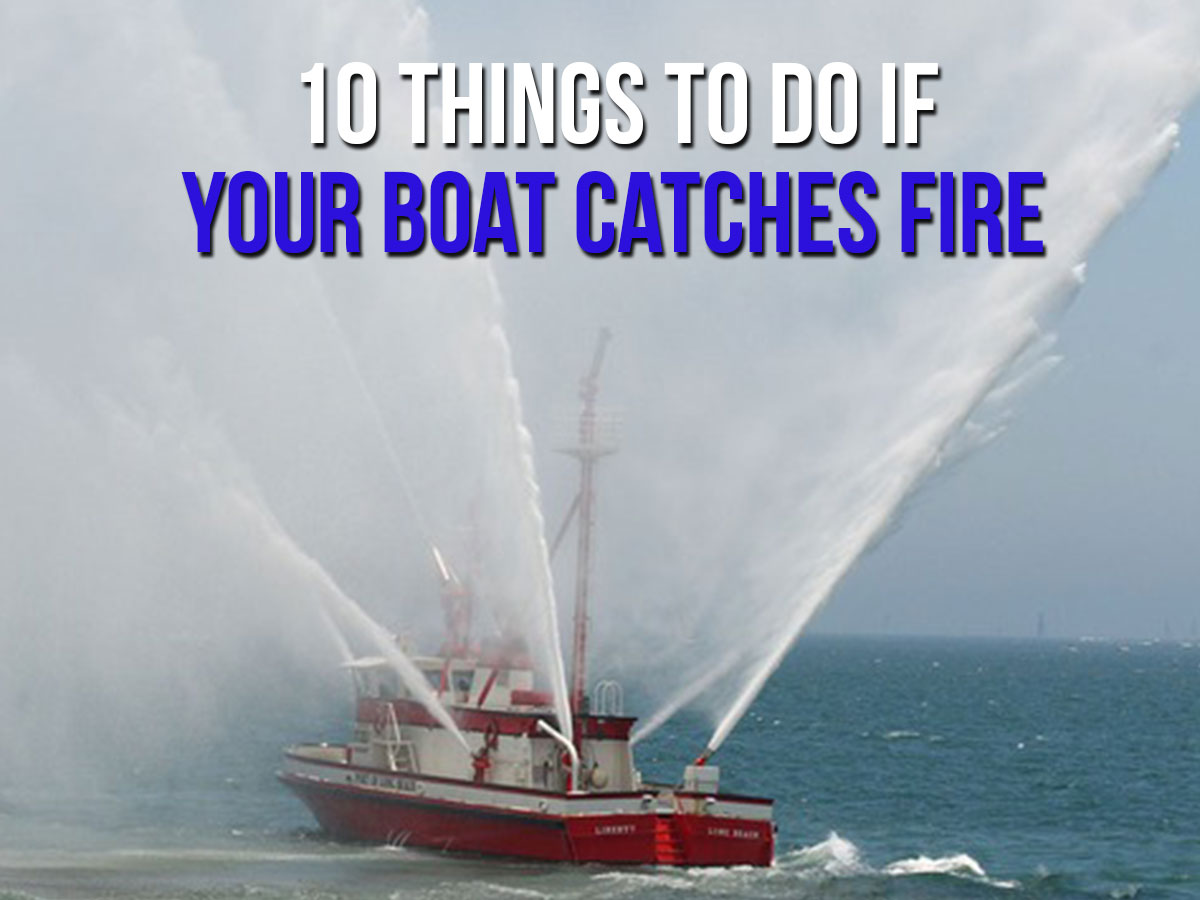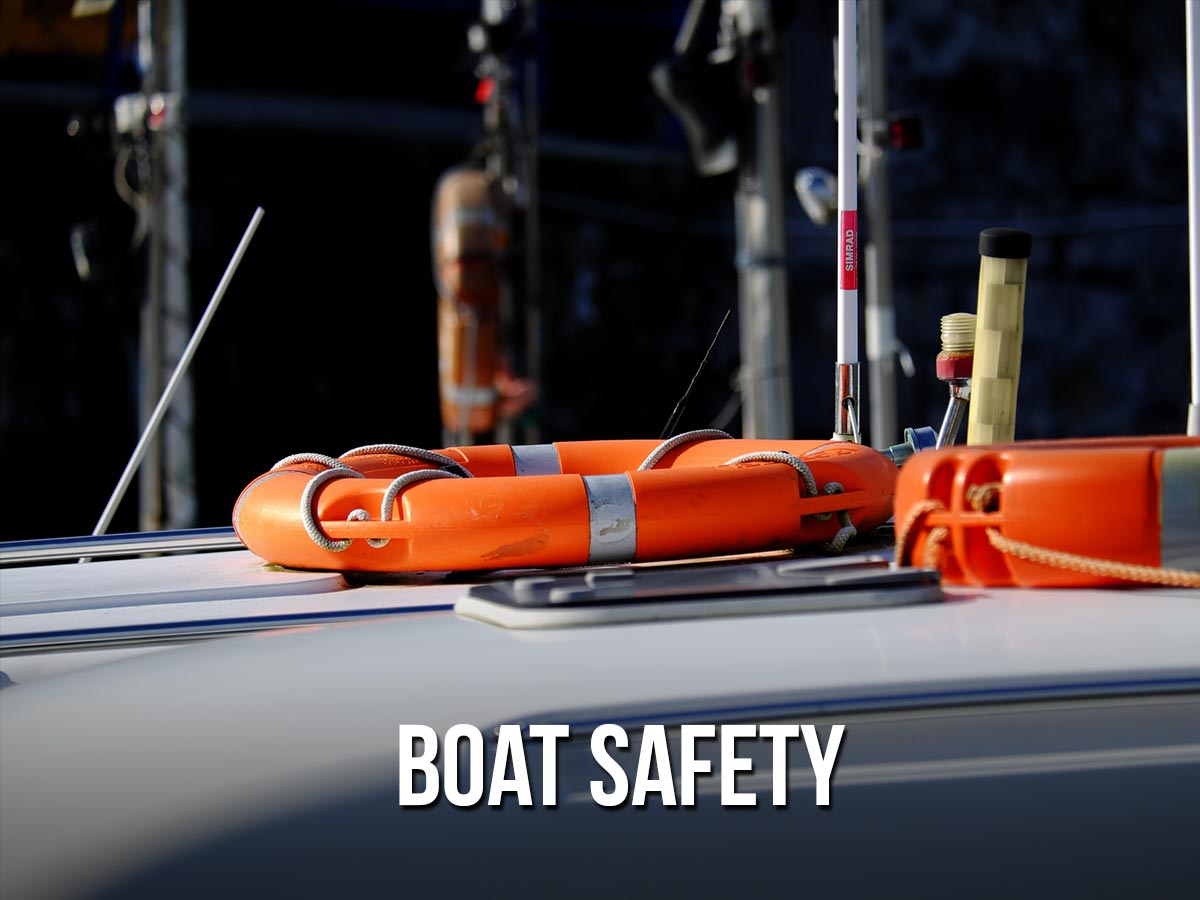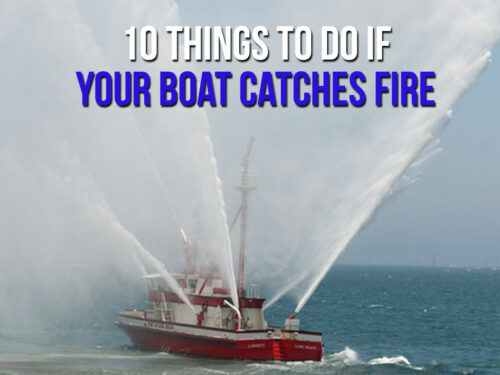A boat catches fire is one of the worst things that could possibly happen. Not only are you in grave danger, but you also have to think about all your belongings on the ship burning up as well. So, if this should ever happen to you, don’t panic and try to keep calm. You’ll need some time—and quick thinking—to get out of the situation safely.
In this article, we’ll give you some tips on how to react if your boat catches fire, so nothing bad happens to you. Let’s read below!

1. Keep Calm
If your boat catches fire, the most important thing you have to do is keep calm. Panicking will only make things worse and put your life in danger. The basic rule of ‘stop, drop, and roll’ doesn’t work here since there’s a lot more going on than just a simple flame on one part of your body. In this situation, you shouldn’t move around a lot. If the fire is small enough for you to do so, feel free to extinguish it with a fire blanket or a fire extinguisher.
2. Turn Off The Engine
Once you find out that your boat is on fire, the first thing to do is turn off the engine. If you have a diesel engine, check if it has any water in the cooling system. If so, drain it immediately by opening up the seacocks. Also, close all fuel lines and vents to prevent flammable vapors from coming into contact with the flames. Once all this is done, open the seacocks and let the engine cool down.
3. Flood the Engine Compartment
Next up, you’ll have to close all engine room hatches and ventilators. If there are any inlets for the bilge pump open, close them as well. Then wait a couple of minutes before opening them again. You need to wait because you don’t want water leaking into your boat when the fire department arrives. Flood the engine compartment and turn your back to the fire. If you can see any smoke coming out of it.
4. Turn off Gas Cylinders
If you have any gas cylinders on board (such as a barbecue cylinder) and they’re not turned off, shut them down immediately. You can do this by locating the manual flow control valve and turning it all the way to the left. If the fire is near your propane cylinder(s), close their valves as well to make sure there’s no chance of the flames coming in contact with them.
5. Warn Other Vessels
If there are other boats near you, inform them by turning on your VHF radio and notifying the traffic around you about what’s happening so they can take appropriate action if needed. If possible, ask any nearby fishing vessels to help while you wait for the fire department to show up.
6. Wait for Help
Bring your boat next to a jetty or near any other solid object you can tie yourself up to so it doesn’t drift away while you wait for help to arrive. If there are any vessels around that are part of the local rescue effort, have them notify the coast guard so they can inform the fire department so it arrives as soon as possible. Also, have your VHF on to receive any updates about what’s happening around you.

7. Move the Passengers to Safe Area
Once you’ve waited long enough for the fire department or any other rescue vessel to arrive, it’s time to move your passengers to a place where they’ll be safe. If there are life rings available onboard, lower them down so they can hold onto them while you wait for help to come. Try not to overload the boat, so it doesn’t tip over or sink. If you have to, ask passengers to sit down as low as possible near the bottom of the boat, so it doesn’t rock too much. In any case, make sure they don’t panic and do as they’re told.
8. Use Marine Fire Extinguisher
If the fire department isn’t around to help you when your boat catches fire, it’s up to you to take action. Make sure you have a marine-type fire extinguisher ready and set to go at all times, so you don’t waste any time in case such an emergency occurs. Try not to use water because it won’t put out a burning engine and will only make things worse. If the flames are coming from the stern of your boat, try throwing sand or foam on them until they’re out. Also, keep in mind that whatever you do, don’t spray your extinguisher into open hatches if there’s gasoline stored inside!
9. Deploy the Life Raft if Needed
If the flames are overwhelming and there’s no chance of putting them out, your best bet is to deploy the life raft. This way, at least, you’ll have a safe place to wait for help with your passengers while you watch your boat burn down into nothing. Make sure everyone gets in it before you do so that they have someone who knows how to operate it in case the worst happens.
10. Contact the Authorities about Your Situation
Once you’re safely on land, make sure to contact all involved authorities (the coast guard/harbor master, etc.) with an update about what happened, where it happened, and how long ago everything occurred. They may need this information for insurance purposes or for future research. Also, let them know if anyone needs medical attention for injuries or smoke inhalation. Whatever you do, don’t go off and leave the scene of the accident without letting them know about it because this will make matters worse in more ways than one.
Conclusion
f you follow all of these steps and do your best to stay calm and think rationally, you should be able to handle a situation like this with the least amount of problems possible. Just make sure you don’t panic and do as told until everyone is safe on land or in a rescue boat.
Discover more articles of interest for you and to navigate in your boat here

